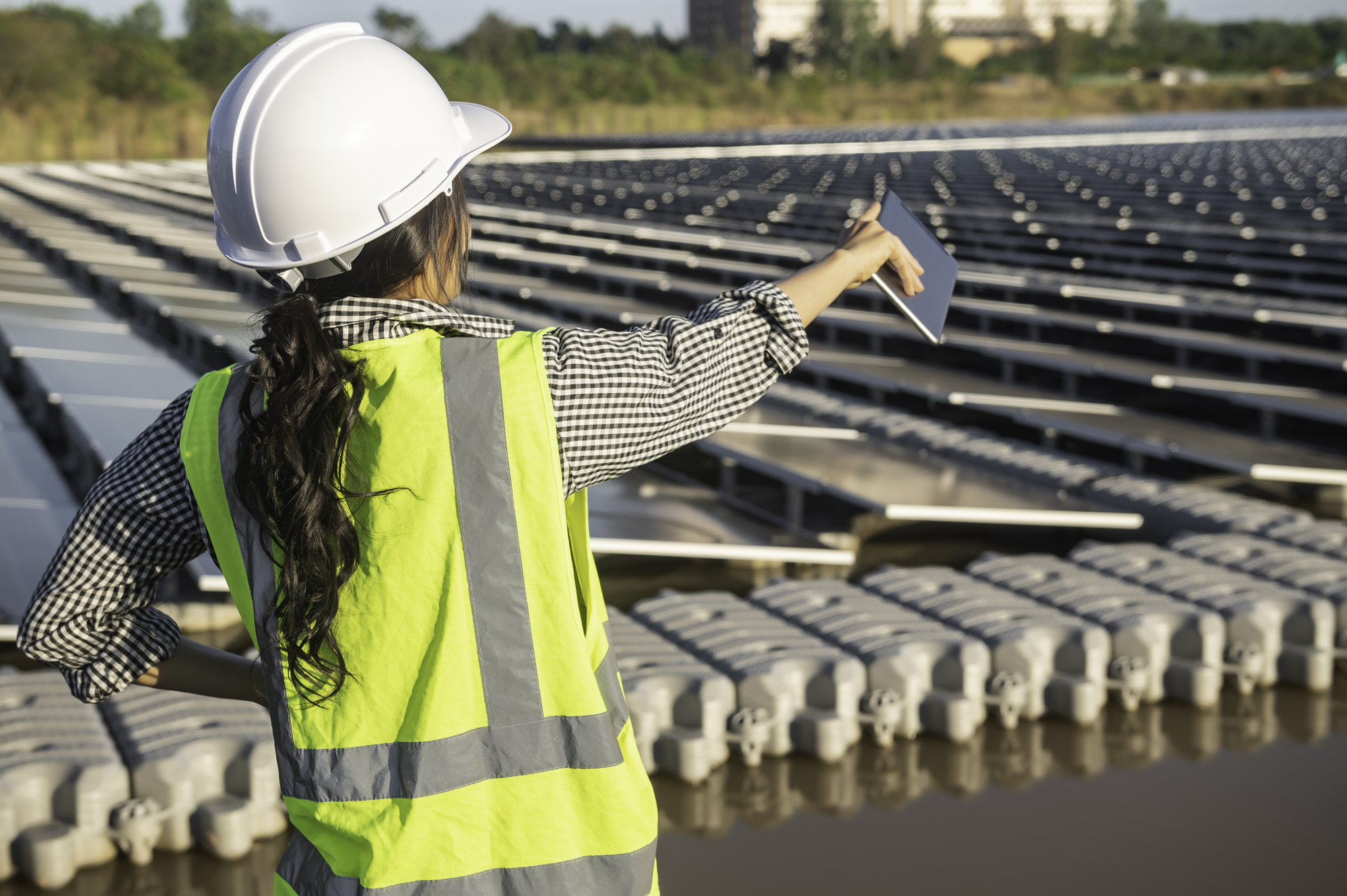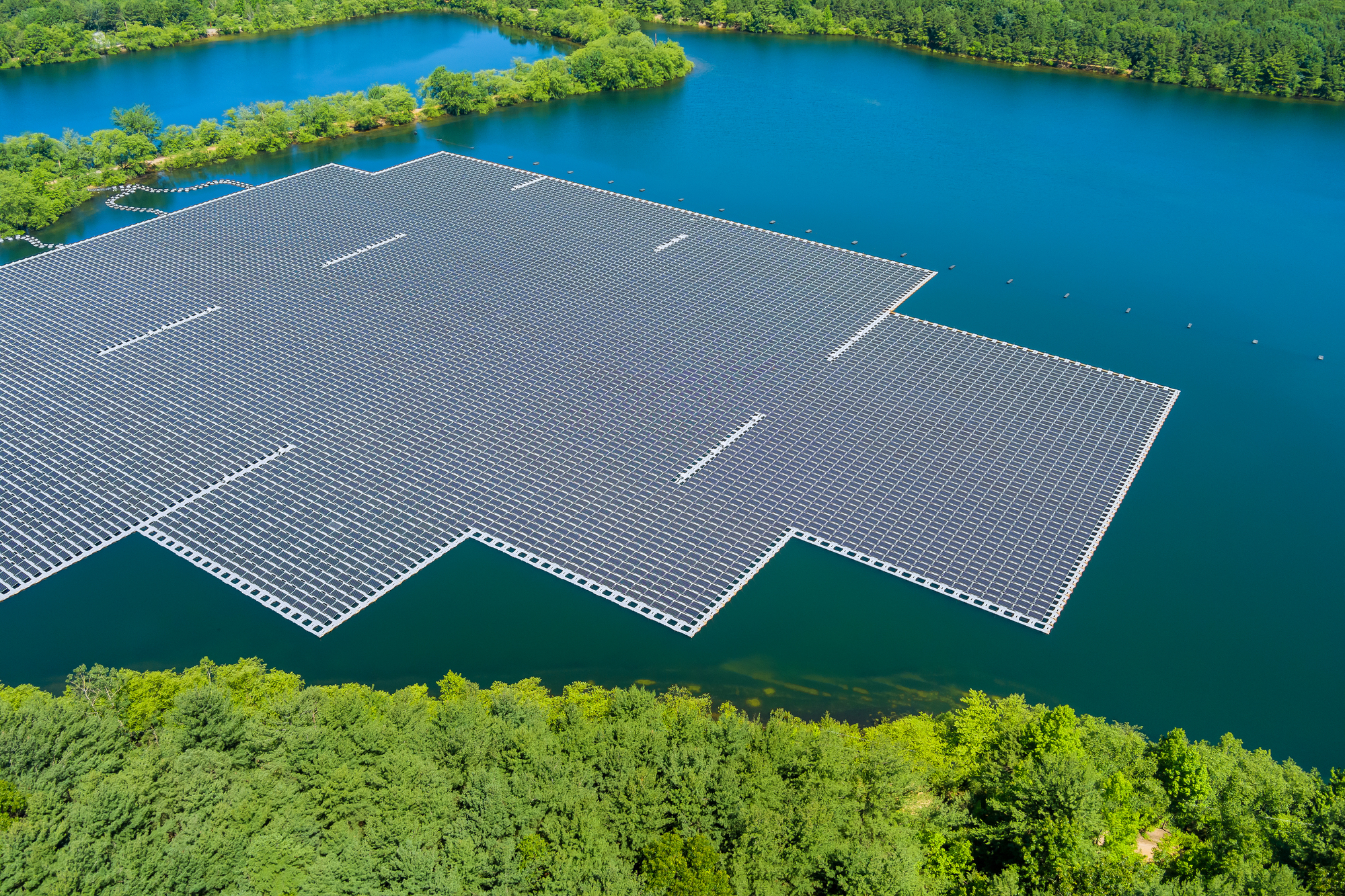This innovative technology, which involves installing solar panels on the surface of water reservoirs, provides both a means to reduce water evaporation and generate clean energy
By Nicolas Netien
As an island nation, Cyprus faces two critical, intertwined challenges: managing our limited water resources and reducing our dependence on imported energy.
With climate change exacerbating water scarcity through increased temperatures and erratic rainfall and rising global energy demands placing additional pressure on resources, we find ourselves at a crossroads. Solutions that address both issues are not just desirable – they are essential.
Floating solar panels could offer a unique and timely response to these problems. This innovative technology, which involves installing solar panels on the surface of water reservoirs, provides both a means to reduce water evaporation and generate clean energy. With Cyprus’ numerous reservoirs and its sunny climate, floating solar installations could be a game-changer for our environmental and energy strategies.
Floating solar panels function similarly to traditional solar arrays but are mounted on platforms that float on the surface of bodies of water such as reservoirs or lakes. These platforms are anchored securely to handle fluctuations in water levels, making them suitable for a variety of conditions. What sets floating solar apart from traditional land-based solar farms is its ability to offer additional benefits like water conservation and increased efficiency.
The cooling effect of the water beneath the panels helps regulate their temperature, preventing the overheating issues often encountered by land-based solar farms in hot climates. This cooling effect can improve the efficiency of the panels, potentially boosting energy production by 10-15 per cent compared to systems installed on land.
Globally, floating solar technology has already gained significant traction. Countries like China, India, Japan and Brazil have embraced this approach, with large-scale projects delivering substantial renewable energy capacity. China, for example, operates one of the world’s largest floating solar farms, which produces 320 megawatts of power –enough to supply electricity to over 100,000 households annually. This global success highlights the potential for floating solar in Cyprus.
Why Floating Solar Makes Sense for Cyprus
- Reduced evaporation
One of the most compelling reasons for Cyprus to consider floating solar panels is their ability to reduce water evaporation – a critical concern for our island. Water scarcity has long been a pressing issue, with our reservoirs often strained during the hot summer months. Prolonged droughts and reduced rainfall further complicate water management, placing added stress on our water supply system. Floating solar panels could help reduce this burden. When installed on reservoirs, they provide shade that can significantly reduce evaporation. Research from similar hot climates suggests that solar panels covering portions of water bodies can reduce evaporation by as much as 70 per cent, depending on coverage and local conditions.
In Cyprus, our domestic water use amounts to approximately 108 million cubic metres annually. By installing floating solar panels on just 10 per cent of our reservoirs, we could potentially save between 5-10 million cubic metres of water per year. This could provide a critical buffer during periods of drought, ensuring that more water remains available for both agricultural and domestic needs. - Preserving land
In Cyprus, land is a valuable and limited resource. Agriculture, residential developments, tourism infrastructure and industrial expansion all compete for space, making land management a delicate balancing act. Unlike traditional solar farms, which require large tracts of land, floating solar farms take advantage of existing water bodies, freeing up land for other critical uses.
By installing solar panels on our reservoirs, we could significantly expand our renewable energy capacity without disrupting agriculture or natural ecosystems. This is particularly important for Cyprus, where land conservation is essential to maintain environmental protection. Floating solar panels would allow us to develop renewable energy infrastructure while safeguarding the land needed to grow our food. - Boosting renewable energy production
Currently, Cyprus relies heavily on imported fossil fuels for its energy needs. Renewable energy sources account for just 13.9 per cent of our total energy consumption – far below the EU average of 22 per cent. The European Union has set a target for Cyprus to reach a 23 per cent share of renewable energy by 2030. This means we need to increase our renewable energy production significantly, and floating solar technology could play a key role in achieving this goal.
The increased efficiency of floating solar panels – due to the cooling effect of water –makes them particularly advantageous in Cyprus’ hot climate. In extreme temperatures, land-based solar panels can lose efficiency as they overheat, but floating solar panels maintain a more optimal temperature.
Research has shown that in regions with high temperatures, such as Cyprus, this cooling effect could lead to 12-15 per cent greater electricity generation compared to traditional land solar farms. This higher efficiency is crucial in helping Cyprus accelerate its progress toward renewable energy goals while reducing dependency on imported fossil fuels and decreasing greenhouse gas emissions.

Challenges to overcome
While the benefits of floating solar panels are clear, there are also challenges that must be addressed to ensure the success of this technology in Cyprus. These challenges include adapting to fluctuating water levels, understanding environmental impacts and conducting thorough cost-benefit analyses.
One key challenge for floating solar panels in Cyprus is the varying water levels in our reservoirs. During periods of drought, water levels can drop significantly, while heavy rainfall can cause reservoirs to swell. These fluctuations can complicate the installation and maintenance of floating solar farms.
However, advancements in floating solar technology have already addressed this issue in other countries. In India, for example, floating solar farms have been installed on reservoirs with fluctuating water levels using flexible mooring systems that can adjust to changing conditions. With careful planning and engineering, Cyprus could follow a similar approach to ensure the stability of floating solar installations.
The environmental impact of floating solar panels must also be carefully considered. While large-scale installations could potentially alter light penetration, affecting aquatic ecosystems, the benefits to these ecosystems can be significant. The cooling effect of the panels can help maintain lower water temperatures, which could protect aquatic species from overheating and oxygen depletion, a common problem in hot climates like Cyprus. Additionally, the panels provide shade, which may reduce the growth of harmful algae and create a more balanced aquatic environment. To maximise these benefits and minimise any negative effects, comprehensive environmental impact assessments should be conducted before project implementation.
While the initial investment for floating solar panels is higher than for traditional land-based systems, the long-term benefits far outweigh the upfront costs. Floating solar farms offer higher efficiency, water conservation and land-use savings, all of which contribute to significant long-term economic gains. Over time, as the technology becomes more widespread and cost-effective, these systems will become even more attractive. In Cyprus, where water scarcity and land limitations are pressing concerns, the savings on water, reduced reliance on fossil fuels and the protection of valuable land resources make floating solar a strategic and economically sound investment. Ultimately, the initial costs are a small price to pay for the immense long-term environmental and financial benefits.
A path forward
The challenges of water scarcity and energy dependence are not new to Cyprus, but the solutions available to us are evolving. Floating solar panels offer a unique opportunity to address both of these critical issues in a sustainable and practical way. By reducing water evaporation, preserving valuable land, and generating clean energy, floating solar technology could help Cyprus meet its renewable energy targets while safeguarding our limited natural resources.
The global success of floating solar installations demonstrates that this technology is not just a theoretical solution – it’s a proven, scalable approach that could deliver real benefits to Cyprus. As we look to the future, it’s time for Cypriot authorities to seriously consider investing in floating solar technology as part of our broader strategy to secure a sustainable and resilient future for our island.
Nicolas Netien is an environmental engineer, specialising in agroecology and permaculture design, based in Cyprus






Click here to change your cookie preferences